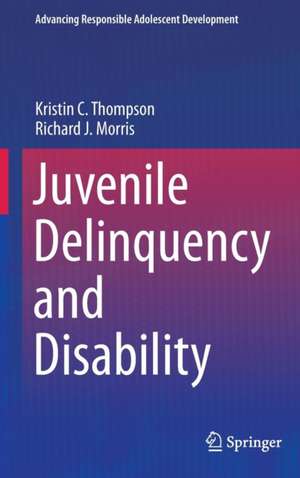Juvenile Delinquency and Disability: Advancing Responsible Adolescent Development
Autor Kristin C. Thompson, Richard J. Morrisen Limba Engleză Hardback – 21 apr 2016
This authoritative volume:
• Identifies characteristics and risk factors associated with juvenile delinquency.
• Reviews evidence relating developmental, mental health, and other disorders to juvenile offending.
• Describes the implications of disabilities in key areas such as offending, risk assessment, competency, and outcomes.
• Examines the role of disability law in the juvenile justice system.
• Offers guidelines for professionals to use this knowledge in their work.
Juvenile Delinquency and Disability is an essential resource for researchers, scientist-practitioners, and graduate students in clinical, counseling, and school psychology, criminology and criminal justice, child psychiatry, educational policy and politics, developmental psychology, and social work.
| Toate formatele și edițiile | Preț | Express |
|---|---|---|
| Paperback (1) | 387.20 lei 6-8 săpt. | |
| Springer International Publishing – 22 apr 2018 | 387.20 lei 6-8 săpt. | |
| Hardback (1) | 394.51 lei 6-8 săpt. | |
| Springer International Publishing – 21 apr 2016 | 394.51 lei 6-8 săpt. |
Din seria Advancing Responsible Adolescent Development
- 20%
 Preț: 567.62 lei
Preț: 567.62 lei - 15%
 Preț: 641.71 lei
Preț: 641.71 lei - 24%
 Preț: 669.06 lei
Preț: 669.06 lei - 15%
 Preț: 645.47 lei
Preț: 645.47 lei -
 Preț: 382.18 lei
Preț: 382.18 lei - 20%
 Preț: 552.44 lei
Preț: 552.44 lei - 5%
 Preț: 1024.80 lei
Preț: 1024.80 lei - 20%
 Preț: 547.90 lei
Preț: 547.90 lei -
 Preț: 389.49 lei
Preț: 389.49 lei - 18%
 Preț: 948.79 lei
Preț: 948.79 lei -
 Preț: 389.11 lei
Preț: 389.11 lei -
 Preț: 384.70 lei
Preț: 384.70 lei - 18%
 Preț: 995.17 lei
Preț: 995.17 lei - 15%
 Preț: 646.94 lei
Preț: 646.94 lei - 24%
 Preț: 804.56 lei
Preț: 804.56 lei - 15%
 Preț: 701.40 lei
Preț: 701.40 lei - 15%
 Preț: 646.30 lei
Preț: 646.30 lei -
 Preț: 391.99 lei
Preț: 391.99 lei - 15%
 Preț: 643.34 lei
Preț: 643.34 lei - 15%
 Preț: 664.29 lei
Preț: 664.29 lei -
 Preț: 395.63 lei
Preț: 395.63 lei -
 Preț: 395.63 lei
Preț: 395.63 lei -
 Preț: 382.75 lei
Preț: 382.75 lei - 18%
 Preț: 733.96 lei
Preț: 733.96 lei
Preț: 394.51 lei
Nou
Puncte Express: 592
Preț estimativ în valută:
75.49€ • 79.02$ • 62.83£
75.49€ • 79.02$ • 62.83£
Carte tipărită la comandă
Livrare economică 31 martie-14 aprilie
Preluare comenzi: 021 569.72.76
Specificații
ISBN-13: 9783319293417
ISBN-10: 3319293419
Pagini: 479
Ilustrații: XIX, 256 p. 6 illus., 2 illus. in color.
Dimensiuni: 155 x 235 x 18 mm
Greutate: 0.57 kg
Ediția:1st ed. 2016
Editura: Springer International Publishing
Colecția Springer
Seria Advancing Responsible Adolescent Development
Locul publicării:Cham, Switzerland
ISBN-10: 3319293419
Pagini: 479
Ilustrații: XIX, 256 p. 6 illus., 2 illus. in color.
Dimensiuni: 155 x 235 x 18 mm
Greutate: 0.57 kg
Ediția:1st ed. 2016
Editura: Springer International Publishing
Colecția Springer
Seria Advancing Responsible Adolescent Development
Locul publicării:Cham, Switzerland
Cuprins
Part I. Introduction to Juvenile Delinquency.- Chapter 1. Introduction and Overview of Book.- Chapter 2. Characteristics of Juvenile Delinquents.- Chapter 3. Juvenile Delinquents with Disabilities.- Chapter 4. Theories of Juvenile Delinquency.- Chapter 5. History of the Juvenile Justice System.- Chapter 6. Disability Law.- Part II. Developmental and Educational Disabilities.- Chapter 7. Developmental Disabilities.- Chapter 8. Learning and Emotional Disabilities.- Part III. Mental Health Disabilities.- Chapter 9. Mental Health Disabilities.- Chapter 10. Mood Disorders.- Chapter 11. Anxiety and Trauma-Related Disorders.- Chapter 12. Externalizing Disorders.- Part IV. Conclusion.- Chapter 13. Conclusion.
Recenzii
“This book explores the intersection between juvenile disability and delinquency, examining the over‐representation of youth with developmental and mental health conditions in the juvenile justice system and providing recommendations for positive changes in the juvenile justice system. … The book is aimed at researchers, scientist‐practitioners, and graduate students in clinical, counseling, and school psychology, criminology and criminal justice, child psychiatry, educational policy andpolitics, developmental psychology, and social work.” (Gary B. Kaniuk, Doody's Book Reviews, July, 2017)
“The authors present an insightful book that incorporates information regarding the prevalence of disabilities in the juvenile justice system, potential predictors for at-risk youth, and the etiology, diagnosis, and many relevant forms of assessment and treatment for youths at risk of incarceration. … Juvenile Delinquency and Disability is an excellent desk reference for practitioners in the social, medical, and psychological fields that offers suggestions regarding assessment and treatment for long-term beneficial outcomes for juveniles with disabilities in the legal system.” (A. Celeste Harvey and Nancy Kirby, PsycCRITIQUES, Vol. 62 (5), January, 2017)Notă biografică
Kristin C. Thompson, Ph.D., is an Assistant Professor of Practice in the School Psychology Program at the University of Arizona. She received her Ph.D. in School Psychology from the University of Arizona after completing an APA-accredited psychology internship within the Wisconsin Department of Corrections (Ethan Allen School for delinquent youth). Dr. Thompson has worked with the juvenile court system in Arizona, and she also maintains a private practice that focuses on assessment, diagnosis and treatment of child and adolescents with learning, emotional, and behavioral problems. She is a member of the American Psychological Association and the National Association of School Psychologists, and is a licensed psychologist and a Nationally Certified School Psychologist. Dr. Thompson has published several research articles and book chapters, as well as presented many professional papers and workshops, in the areas of juvenile delinquency and child and adolescent mental health. Her current research interests include the relationship between juvenile delinquency and disability, juvenile justice policy, and interventions for students with emotional and behavioral disorders.
Richard J. Morris, Ph.D., is the Meyerson Foundation Distinguished Professor Emeritus of Disability and Rehabilitation and Professor Emeritus of School Psychology in the Department of Disability and Psychoeducational Studies, College of Education, The University of Arizona. He has been elected a Fellow of the American Psychological Association (APA), Charter Fellow of the Association for Psychological Science and a Fellow of the American Association on Intellectual and Developmental Disabilities. He has authored or edited 14 books, written more than 120 journal articles and book chapters, and has made more than 150 professional presentations in the areas of child and adolescent psychotherapy, child and adult psychopathology, juvenile delinquency, school-based mental health services, professional and ethical issues in the delivery of psychological services to children and adults, and disability policy issues. His books include: The Practice of Child Therapy, 4th edition (with Thomas R. Kratochwill, Ph.D.); Evidenced-Based Interventions for Students with Learning and Emotional Difficulties (with Nancy Mather, Ph.D.); Disability Research and Policy: Current Perspectives; Handbook of Psychotherapy with Children and Adolescents (with Thomas R. Kratochwill); and, Treating Children’s Fears and Phobias: A Behavioral Approach (with Thomas R. Kratochwill). His current research interests include: the relationship between disability and juvenile delinquency, managing childhood aggressive and disruptive behaviors in the classroom, and legal and ethical issues associated with the delivery of children's mental health services. Dr. Morris is a former Chair and Board Member of the State of Arizona, Board of Psychologist Examiners; past member of the APA Ethics Committee and past Chair of the APA Membership Committee; and, past Board Trustee of the American Insurance Trust (formerly, the “American Psychological Association Insurance Trust”). At present, Dr. Morris serves as a member of the Board of Directors of the Potomac National Security Reinsurance Company, Ltd., focusing on professional liability insurance.
Textul de pe ultima copertă
This book discusses the relationship between juvenile disability and delinquency, including characteristics of youth with disabilities, how disability relates to delinquency, and its impact during a youth’s involvement with the juvenile justice system. The book details the relationship between developmental, cognitive, psychological, and educational disorders—specific conditions including ADHD, bipolar disorder, and autism spectrum disorder—and delinquency in light of both their overrepresentation among youth offenders and the uninformed handling of these youth within the court system. Case studies illustrate the complexities in the processing and placement of these youth offenders, as well as highlight the barriers to delinquent youth receiving appropriate treatment, and their increased risk of reoffending. From this robust knowledge base, the authors make expert recommendations for improving the juvenile justice system at the practice and policy levels to better serve this population.
This authoritative volume:
• Identifies characteristics and risk factors associated with juvenile delinquency.
• Reviews evidence relating developmental, mental health, and other disorders to juvenile offending.
• Describes the implications of disabilities in key areas such as offending, risk assessment, competency, and outcomes.
• Examines the role of disability law in the juvenile justice system.
• Offers guidelines for professionals to use this knowledge in their work.
Juvenile Delinquency and Disability is an essential resource for researchers, scientist-practitioners, and graduate students in clinical, counseling, and school psychology, criminology and criminal justice, child psychiatry, educational policy and politics, developmental psychology, and social work.
This authoritative volume:
• Identifies characteristics and risk factors associated with juvenile delinquency.
• Reviews evidence relating developmental, mental health, and other disorders to juvenile offending.
• Describes the implications of disabilities in key areas such as offending, risk assessment, competency, and outcomes.
• Examines the role of disability law in the juvenile justice system.
• Offers guidelines for professionals to use this knowledge in their work.
Juvenile Delinquency and Disability is an essential resource for researchers, scientist-practitioners, and graduate students in clinical, counseling, and school psychology, criminology and criminal justice, child psychiatry, educational policy and politics, developmental psychology, and social work.
Caracteristici
Synthesizes evidence-based research related to delinquents with disabilities Examines treatment issues related to cognitive, mental health, and educational disabilities Discusses intervention and treatment protocols as well as policy for juveniles with disabilities in the criminal justice system Summarizes characteristics of youth with disabilities and how they relate to delinquency and affect treatment? Includes supplementary material: sn.pub/extras















